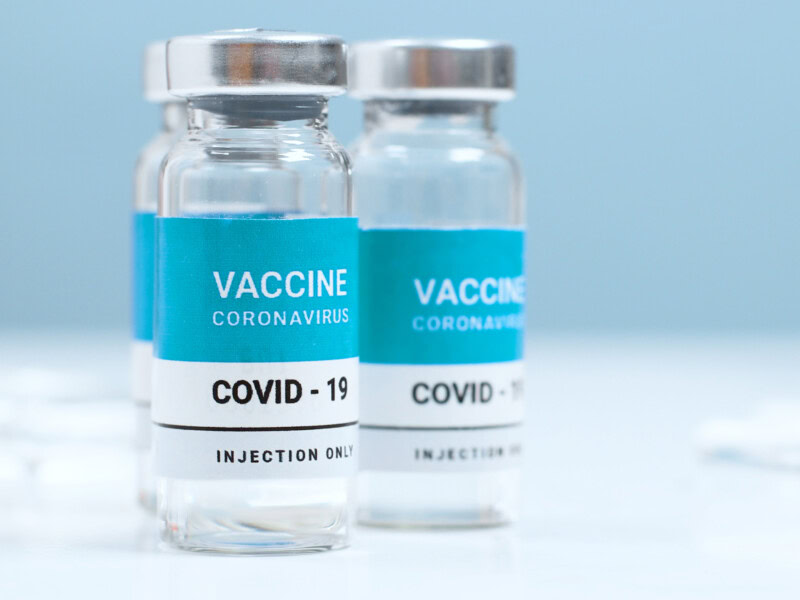After nearly a year of enduring the pandemic, COVID-19 vaccinations have started becoming available to the U.S. population. Already, millions in the U.S. have received a vaccination, and the vaccines have undergone the most intensive safety monitoring in U.S. history. But many questions still surround the efficacy and effects of the vaccines. In today’s blog post, we hope to answer some of these frequently asked questions.
How do the available vaccines work?
There are currently two vaccines available in the U.S., one developed by Pfizer/BioNTech, and another by Moderna. Both work via a mechanism called messenger RNA (mRNA). No live virus or viral genetic material is involved: you cannot become infected with COVID-19 from either COVID-19 vaccine. The mRNA in these vaccines carry instructions for our immune cells to create a harmless piece of “spike protein.” This protein is found on the surface of the virus that causes COVID-19. When the vaccine is administered, the body recognizes the spike protein and kickstarts an immune response against it. Then, if the vaccinated person is later exposed to coronavirus, their immune system recognizes the spike protein and fights the infection.
How effective are the vaccines, and how long will they work?
Both vaccines available in the U.S. are remarkably effective. In large clinical trials, thousands of people of mixed age, sex, race, ethnicity, and underlying health conditions received the vaccine or placebo. Clinical trials demonstrated that the vaccines lowered the chance of developing COVID-19 by 95 percent, and furthermore, it prevented severe disease in others.
Since the vaccines have been tested only since summer of 2020, durability of protection is still a developing area. Clinical trials for the Moderna vaccine suggested that neutralizing antibodies persisted for nearly four months. There is currently no specific recommendation for booster vaccine doses.
What do we know about the vaccines’ short-term safety?
Both mRNA vaccines are quite safe. Some people do not experience side effects at all. Many will show mild side effects such as pain, swelling at the injection site, headache, chills, or fever. Such reactions are normal and show the vaccine is working. These side effects generally resolve within a couple of days and are responsive to over-the-counter drugs like acetaminophen or ibuprofen.
In general, side effects are more common in younger recipients than older, with the second shot inducing more side effects than the first. Severe allergic reactions to the vaccines are rare: between 1 in 100,000 and 1 in 400,000. In contrast, severe allergic reaction to the antibiotic penicillin occurs in about 1 in 5,000 people. If allergic reaction does occur, vaccination providers have medicines available to effectively and immediately treat the reaction.
What do we know about the vaccines’ long-term safety?
Clinical trials for both vaccines began in summer of 2020, so currently we currently have only a few months of follow-up to vaccine recipients. But with other established vaccines, severe reactions typically occur within days or weeks of administration. Long-term side effects with vaccines are quite rare, and most claimed associations have been debunked by carefully done population-based studies.
Is one vaccine preferrable to the other?
Both the Pfizer/BioNTech and Moderna vaccines have similar mechanisms of action, safety, and efficiency. The Pfizer/BioNTech vaccine is authorized for recipients of age 16 or older, and Moderna’s for ages 18 and older. Aside from this age difference, there is no group better suited to one vaccine or the other. Both vaccines require two shots.
After someone has received the first shot, the second should be completed with the same vaccine on the recommended schedule if possible (21 days separate the doses with the Pfizer/BioNTech vaccine, versus 28 days with the Moderna vaccine). The CDC now states that if the first-dose vaccine type cannot be determined or is no longer available, any available mRNA COVID-19 vaccine may be given at a minimum 28 days after the first shot.
Should pregnant or breastfeeding women receive the vaccine?
There is currently no evidence that antibodies formed from COVID-19 vaccination cause any problems with pregnancy, fetuses, or fertility. However, potential risk to the pregnant person and the fetus are largely unknown, since these vaccines have not been studied in pregnant people. Studies in pregnant people are planned, and the vaccine manufacturers are following outcomes in people in the clinical trials who became pregnant.
Will I test positive for COVID-19 after getting vaccinated?
No. Neither the Pfizer/BioNTech and Moderna vaccines, nor the other COVID-19 vaccines currently in clinical trials in the U.S. can cause you to test positive on viral tests, which are used to see if you have a current infection.
Can I still spread COVID-19 if I have been vaccinated?
Many people who become infected with the virus that causes COVID-19 display no symptoms, but can still transmit the virus to others. Although it’s very likely the vaccines will reduce the ability to transmit the virus, more research is underway to understand this topic better. Until more information is available, the CDC recommends continue practicing measures like social distancing, wearing face coverings/masks, avoiding crowded indoor settings, and regular hand washing.
Can I still be vaccinated if I have previously recovered from COVID-19?
Yes. There were participants in the vaccine clinical trials who had previously recovered from COVID-19 and the vaccines were safe and effective in this group. Since re-infection after recovery from COVID-19 is unlikely in the first 90 days, some may wish to defer their vaccination for this period of time. But due to the severe health risks associated with COVID-19 and the fact that re-infection is possible, the CDC recommends getting vaccinated regardless of whether a person has already had COVID-19.
For more information, check out the FDA-required fact sheets for the Pfizer/BioNTech vaccine here (https://www.fda.gov/media/144414/download) and the Moderna vaccine here (https://www.modernatx.com/covid19vaccine-eua/eua-fact-sheet-recipients.pdf). Do you need help assuring your workers you’ve done everything you can to protect their health and safety? Leave it to CTEH. Read more about our COVID-19 services here. (https://www.cteh.com/service-detail/pandemic-response)
Any scientific or medical information included in this article is current as of the date of publication; however, public health knowledge of COVID-19 is rapidly developing. Readers are advised to monitor national, state and local public health agencies for current recommendations regarding any infectious disease.




